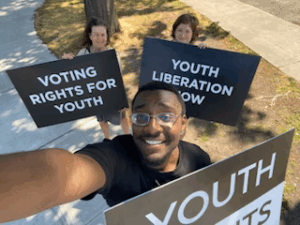I joined NYRA in 2003 after reading about it in a news article about the voting age. This wasn’t my first introduction to youth rights—I’ve believed in youth rights, though I didn’t call it that in my own head, for as long as I can remember—but it was my first indication that other people believed in this as well, much less that they could be taken remotely seriously. I joined almost immediately. Even though I didn’t become involved in volunteering or donating right away, just knowing that I was part of a community of like-minded people gave me hope that youth rights ideas could one day become mainstream.
 When I joined, I believed that NYRA was a well-established organization with an enormous national membership and an army of staff and volunteers. After all, it had been mentioned prominently in a national news story. Although a middle school friend of mine tried to persuade me to take a larger role within NYRA, I fought back, mostly out of my belief that a large, robust organization like NYRA wouldn’t need my help, and probably at least partially because I had internalized some of the ageist messages I’d spent so much of my life hearing: what could a middle schooler have to offer?
When I joined, I believed that NYRA was a well-established organization with an enormous national membership and an army of staff and volunteers. After all, it had been mentioned prominently in a national news story. Although a middle school friend of mine tried to persuade me to take a larger role within NYRA, I fought back, mostly out of my belief that a large, robust organization like NYRA wouldn’t need my help, and probably at least partially because I had internalized some of the ageist messages I’d spent so much of my life hearing: what could a middle schooler have to offer?
Of course, my belief was quickly shattered. But in the process of learning that NYRA was a much smaller, closer-knit community than I had assumed, I became much more involved and made new friends, both in person and online. My connection to NYRA, and youth rights more generally, would come to largely define the next several years of my life.
In high school, some friends and I started a youth rights club. The club, though short-lived, scored a major victory against a local youth curfew which had been on the books for decades. This was an exciting and formative experience for me, but couldn’t have happened without the backing of NYRA and other people and organizations like the ACLU. In turn, it has allowed me to give hope and advice to future generations of NYRA members. The curfew fight underscores many of my thoughts on youth rights activism, and activism in general. First, you need to be persistent. Our campaign took over a year of attending meetings, planning arguments, giving presentations, making contacts, and attending more meetings. Second, you’ll get farther by challenging beliefs than by ridiculing them. The town where I grew up was proudly progressive, and the members of the board we were trying to persuade were no different. When presented with evidence that they were dealing with a real civil rights issue (and especially when confronted with a letter from the ACLU to that effect), I believe they were forced to question whether they were on the right side of history. I could go on.
It has now been 11 years since the curfew fight and 15 years since I first joined NYRA. In that time, NYRA has grown closer to the organization I believed it to be when I first joined, and I’m proud to see all of the progress it’s made, both as an organization, and in getting its policies adopted on local scales. I’ve long since left NYRA to younger, and more capable, hands, but my belief in youth rights hasn’t diminished. I still check in every once in a while, cheer every victory, decry every outrage and express my opinions enough that they get reduced to a neat party trick (“Hey, have an hour to kill? Ask Stefan what he thinks about the voting age.”)
To me, NYRA is a source of hope. I drew on this source as a frustrated elementary schooler feeling alone in my beliefs, again as a high schooler (almost literally) fighting city hall, and probably many other times as well. As a member and a leader, my goal was to give back. Even on NYRA’s once-thriving web forums, which made up a large part of my middle and high school social experience, I came for the flame wars (not really), but stayed for the occasional newcomer who would find us accidentally and look to us for help. One of my foremost goals in volunteering for NYRA, serving on its board of directors, and giving advice to its current leaders in the time since I left the board, has been to preserve this source of hope so that others might make use of it as I did. The most rewarding part of working with NYRA was always thinking that my work might have helped a student fighting an unfair school policy, or someone trying to end a local curfew, or even just a lonely youth rights believer looking for a community. I hope NYRA will continue to grow and thrive, but if nothing else, I hope it will continue to give advice and comfort to those affected by ageism. Here’s to the next 20 years.
Stefan Muller
President, Board member 2007-2010, 2012-2013








Thank you for your great work for youth rights, Stefan!